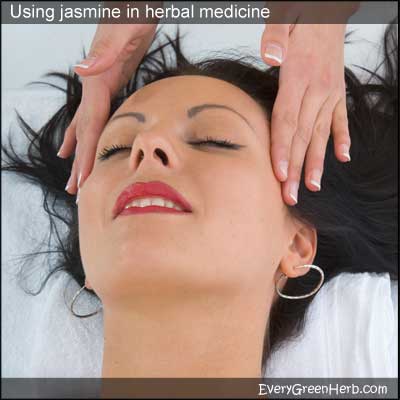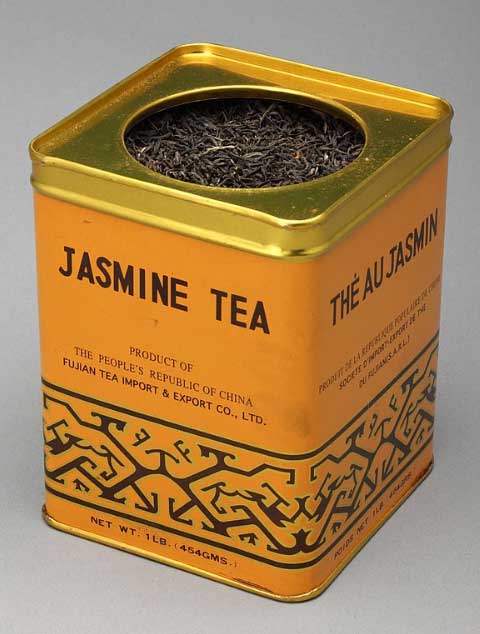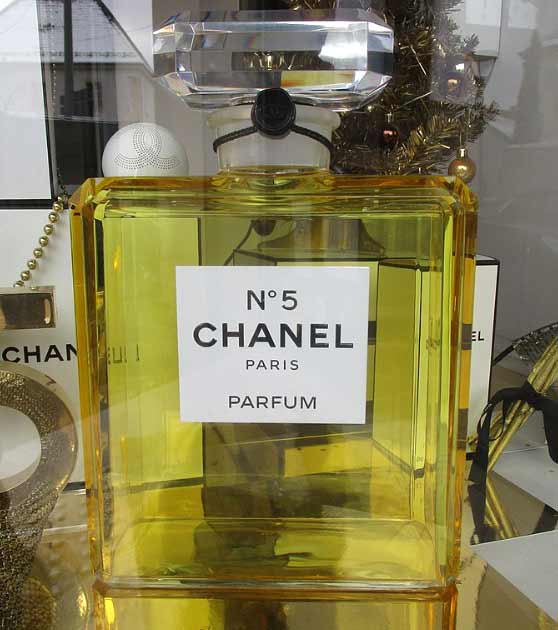Jasmine in herbal medicine
Healing scents are used the world over to bring health, happiness, and peace of mind. Jasmine is one of my favorite healing flowers due to it's sweet aroma.

Jasmine (Jasminum Grandiflorum or Jasminum Officinale) is usually used in essential oil form. Jasmine essential oil gives quick relief from spasmodic coughs, muscle cramps, congestion, asthma, breathlessness, and intestinal cramps.
Jasmine flowers are also added to black and oblong teas for flavor.
The scent of jasmine, when used in aromatherapy, can improve the darkest of moods. When rubbed on the temples, jasmine essential oil promotes feelings of well-being, optimism, and happiness.
Jasmine has a heady, floral, scent that stirs the senses. The oil is very feminine and can be dabbed on the wrists like perfume.
Jasmine oil is useful in facial massage.It smoothes the skin and reduces fine wrinkles.
For depression, massage the temples with a jasmine blend. Always dilute with a good carrier oil before applying to the skin!

Jasmine's scent is uplifting.
Jasmine's warm fragrance lifts the spirits and helps fight depression. It is considered a remedy for stress, anxiety, laryngitis, mental tension, headache, coughs, depression, labor pains, and irritated skin.
Add a few drops to herbal lotions, creams, shampoos, and hair rinses for a luxurious beauty product.
Jasmine essential oil stops many infections on contact.
Jasmine essential oil is used to treat stubborn wounds. According to an article published in Healthline, "A recent animal study found jasmine extract was able to speed up healing of chronic wounds, such as diabetic ulcers. It significantly enhanced wound contraction and granulation tissue formation, and increased new blood vessel formation."
Applying diluted jasmine oil to minor wounds, such as small scratches and cuts, will help them heal faster.
Jasmine literally stops many infections (including tetanus) on contact.
Jasmine essential oil can improve sex drive.
Jasmine essential oil can improve the libido and is considered an aphrodisiac. The herbal oil brings about romance and is often used in other cultures to perfume the bridal chambers.
The use of jasmine is known to increase spermatozoa and to help cure impotence. Jasmine is associated with water and the moon which are both symbols of fertility.
Jasmine essential oil can be used in aromatherapy to relieve coughs.
Jasmine essential oil is a good expectorant. It gives relief from coughs by helping clear the phlegm in the respiratory tract. Use before bed for a restful nights sleep when suffering from colds and flu.
Jasmine essential oil is especially good for women.
Jasmine is often used as a woman’s tonic. It is good when treating painful menstruation or menopausal symptoms.
Jasmine helps to reduce labor pain. It increases milk flow and is very good for lactating mothers and their babies.
Jasmine also helps protect from breast tumors and breast cancer.
Pregnant women should not use Jasmine essential oil until the labor process begins. Jasmine is a uterine stimulant and could bring about premature delivery.
Jasmine essential oil calms the body.
Jasmine essential oil is sometimes used as a sedative. It calms the body and mind to help bring about a positive outlook. When used in aromatherapy, jasmine essential oil can relieve anxiety, stress, annoyance, and anger.
It is also used to treat addiction.
In India, jasmine is used to expel worms, remove corns, in the treatment of ulcers, to regulate menstrual flow, to clean the kidneys, and to help inflamed eyes.
Jasmine essential oil blends well with bergamot, sandalwood, rose, orange, lemon, lime, and grapefruit essential oils. It is used in many commercial fragrances and other fine cosmetics.

Jasmine helps calm bronchitis.
Jasmine also regulates respiration, deepens breathing, and calms spasms associated with bronchitis and lung problems.
Jasmine is called Mistress of the Night.
Jasmine is known as Mistress of the Night or Moonlight of the Grove. Jasmine has an intoxicating, sweet, and exotic scent that is definitely floral. In India, jasmine is considered the essence of mystery and magic.
Indian women have used jasmine for centuries to scent their hair. The scent of jasmine flowers is known to have a profound spiritual effect on some people.
Jasmine is known as King of Flowers.
Jasmine is usually used in oil form and is especially suited for aromatherapy. It can bring about feeling of sexual desire.
Cleopatra used jasmine to attract Mark Anthony! An old saying goes, “Rose is the queen of flowers. Jasmine is the king.”
Jasmine essential oil can be overpowering.
Jasmine oil is powerful. It should be used in very small quantities. Start with just one drop! Overuse can cause headaches and nausea.
Jasmine is an adaptogen.
Jasmine, like lavender, has an unusual property in that it can be used as a stimulant or a relaxant depending on what the user needs.
Need some energy? Apply a drop of jasmine essential oil to each wrist and sniff often during exercise.
Need to relax? Pour a few drops into a hot bath and soak for a while.
Jasmine energizes or relaxes depending on need.
Dilute jasmine essential oil for use on skin tumors and skin ulcers.
Jasmine is known to help balance hormones.
Jasmine is sometimes used to strengthen contractions and control pain during labor.
In a diluted state, Jasmine is used to help heal skin ulcers and tumors.
Problem skin? Try Jasmine essential oil.
Jasmine essential oil is great for the skin. It can greatly improve the appearance of scarring left by boils, acne, and chicken pox.
It helps protect and heal cracked and chapped skin. Use in moisturizers, lotions, and creams for smooth, youthful looking skin. Read more about making your own herbal products at home.
Jasmine is excellent for sensitive skin where other oils may cause irritation, burning, or rash. Read more about herbal remedies for skin problems.
Jasmine increases skin elasticity.
Jasmine has a softening effect on skin. It helps prevent scarring by increasing the skin’s elasticity and is good for all skin types.
For cosmetic use, mix jasmine oil with lavender and tangerine essential oil. Add to a good carrier such as almond or grape seed oil. This makes a wonderful blend for facial massage or for use in herbal creams.
Jasmine is also an excellent addition to use in full body massage.

Pure jasmine oil is a deep-mahogany color and very expensive.
The best jasmine oil is extracted from the fresh flower petals through a process called enfleurage.
Less expensive jasmine essential oil is extracted from the flower of the night-blooming jasmine plant with chemical solvents. It is actually an absolute. Absolutes are fine for use in aromatherapy and herbal beauty products but should not be taken internally.
I use jasmine absolute in aromatherapy, creams, ointments, and occasionally as a perfume. It is one of my favorite scents.
Jasmine absolute ranges in price from $15 to $50 per fluid ounce. Most cheaper jasmine essential oils are synthetic and should not be used in herbal medicine or aromatherapy. Bargain essential oils are usually poor quality so be careful and always purchase from a reliable dealer.
Science, jasmine, and herbal medicine
Studies show that jasmine essential oil increases breathing rate, blood oxygen saturation, and blood pressure. Volunteers rated themselves more alert and more vigorous after applications of jasmine essential oil to the abdomen.
Jasmine has also been tested as an antibacterial agent. It is shown to be effective against several harmful bacteria including E. coli.
Jasmine fragrance is long lasting.
Jasmine is an ingredient in many fine perfumes and is considered a base note in the perfume industry. Jasmine is a key ingredient in Chanel No. 5.
Jasmine is an exotic, long-lasting fragrance. The blooming flowers exude a strong perfume at dawn. Each flower must be picked by hand for use in the enfleurage process.
Jasmine blends well with rose and citrus essential oils like orange and neroli.
Jasmine is a beautiful vine that bears sweet smelling, white flowers.
In this video, the Aromahead Institute explains how both ylang-ylang and jasmine essential oils are expensive because of the way they are harvested, and how much plant material it takes to create just a little essential oil.
Jasmine likes warm weather.
The jasmine plant is a creeper, belonging to the oleaceae family. Jasmine has small, dark, shiny leaves with yellow or white flowers. It requires lots of sunshine and warm weather.
The jasmine plant originated in China.
Jasmine is an evergreen plant that grows up to 35 feet. The vine has gorgeous star shaped white flowers that are picked during the night, when their fragrance is the most intense. The Jasmine plant originated in China and northern India.
Italy, Morocco, Egypt, China, Japan, and Turkey are currently the largest producers of Jasmine absolutes.
*Do not take essential oils internally. Always dilute essential oils with good carrier oil such as almond or cold-pressed olive oil, and test on small area of skin before use. Always consult with a healthcare professional before using any herbal remedy especially if pregnant, nursing, or taking other medicines.
Sources:
https://www.ncbi.nlm.nih.gov/pmc/articles/PMC2792499/
https://pubmed.ncbi.nlm.nih.gov/20184043/
Blessings to you and yours!
Thanks so much for reading my blog. Jan.

*Note - the information on this website has not been evaluated by the Food and Drug Administration.
© 2005-2024 website design and content by Janice Boling